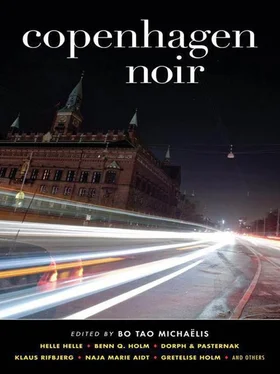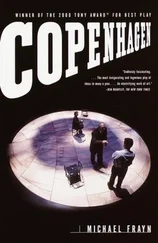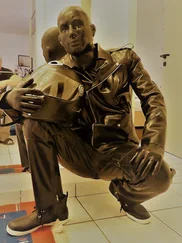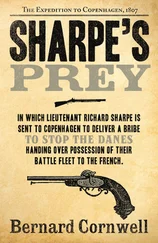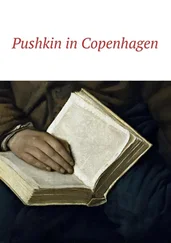Malmø’s oldest porn shop, The Cave, will finally be crowded out of the Herman neighborhood, along with a small furniture store, a hat shop, a photo shop, and a knick-knack boutique.
Because Värnhemstorget, this complete social and architectural mistake, is about to be restructured. A new area, Gateway to Malmø, will be built up right along the approach to the city. The homeless people have been forced into Rörsjöparken, near the city center. They too want to be near where the money is, it’s that simple, whether you’re a bicycle messenger or a CEO. The easternmost parts of the city are moving further and further in toward the canals. The boundaries are being erased.
All the falafel stands have had their rental agreements canceled. The only constant in the area are the junkies who circle back and forth. The address Hermansgatan number 8 has been junkie central ever since the square was built. If you’ve lost your bicycle or your stereo, you can be certain that’s where you can find it, number 8, third floor-the only apartment in the area with a glass-enclosed balcony.
Every evening and morning security guards patrol the area. Along the back of supermarket parking lots and construction sites found all over the area, the streets are filthy with construction dust and refuse. Everything with any kind of scrap value has already been stolen or carted away. The copper thieves come out at night, digging and drilling like moles for anything that can be melted down and transformed. Even here in the underground, everything is a constant hunt for money.
“It looks like a warzone…” the security guard Jan Brandberg thinks when he walks his nightly round, shining a beam behind the scaffolding with his powerful flashlight. The dog pulls at the leash, searching and straining-but no one’s out there, all is empty, the world is on standby. As usual, Brandberg turns at the end of Hermansgatan and walks back toward the park again. He usually stops by the tent camp to make sure no one’s about to freeze to death. He was taught to show this consideration by an older colleague: “It has to do with finding a balance…” He couldn’t help asking: “Which balance?” “You must try to be careful with human life.” And since then he’s made sure to check in on the rag piles-made sure there was life, that they moved when he poked them with the tip of his foot. “Even they are human beings, in a way…”
During the last few days the water in the canals has risen. Cans, twigs, and plastic float about on the surface. The water slowly rises toward the edges of the canal. Everything’s in movement. The public shelter has just opened its doors, and the first guests take off, always junkies first, the mentally ill last. It’s all driven by hunger, by need. The mornings are always chaotic, and everything’s again pushed to the extreme.
To live. To survive.
Rörsjöparken is empty. The pond in the middle of the park is filled with rainwater and garbage. The benches were moved inside the municipal storage buildings at the beginning of September. A siren cuts through the morning as the fog comes rolling in from Öresund. In the last few years the population has grown more and more quickly. At the same time, organized violent crime has become rampant in the city. We cluster together. Everything’s about ownership. The alternative being: to be owned. Between these poles we are tossed about, like balls in a pinball game, more or less out of control, at the mercy of the times we live in, of our desires.
Morning arrives. Pale gray, it comes like a swollen wave, at first silently, then with all its violent power. So much happens when a town wakes up, so much it’s not possible to catch, to describe, no matter how hard you try. Birds take off into the sky, light flickers on the water in the canal, traffic becomes heavier. All these sounds, all the sudden feelings. Life is suddenly in the balance: to jump or not, shoot up or not, sleep in or not. The big and the small, it’s all caught in a whirl of hope and despair.
There’s light and there’s darkness, the dry and that which is still damp. On this day, Christian Westin sits in the basement storage room belonging to his mother’s apartment at Allhemsgatan number 7. Westin has now been awake for seven days straight and the demons are getting closer and closer. They breathe and hiss in the dark basement. Westin’s mother usually comes down to check on him at some point during the day. There’s very little left of what was once the man Christian Westin. He’s quickly transforming into a chemical monster. Today he’s going to collapse in epileptic spasms and repeatedly beat his head against the cold basement floor. That’s to be expected, nothing out of the ordinary. At the edge of one of the larger and more spectacular investigations in Sweden, his name is going to appear momentarily in public when one of his knives is found near a crime scene and it is thought, or rather hoped, that Westin might be involved. It would have been the easiest explanation. But this is not to be. Nothing is as simple as you hope. The morning is like an arrow, shot into space at random.
And death, too, might seem this way.
* * *
On this early morning, while the sky slowly deepens and brightens, the gray growing slightly grayer, a woman will be murdered. She will be thrown into the backseat of a large sedan and transported to a place she hasn’t visited for quite a while-the outer edges of the housing ghetto Västra Hamnen. The last time here, she was in a professional capacity. And one might say that now she’s also here acting that role. She plays her part, even in death. She died somewhere else and the murderer has brought her to a one-way street out here in Kirseberg where he parks next to Sven-Olle’s car service. Alongside the construction sites, there are trailers where the company houses their employees: Poles, Latvians, Germans. The illegal workforce imported from surrounding countries is big business, worth millions. But as with everything else-it’s within the pyramid where power figurings and transformation take place, where undeclared, almost invisible money is laundered.
It was all about time.
Fragments of time, dark oceans of time. Time by the drop, time like water-filled underground cavities. Time that curses and time that liberates, that heals and tears apart. All that must be changed, all that holds the eternal.
There’s a time to love. A time to die.
Everything existed side by side, shoulder to shoulder.
The housing areas in and near the center of the city were being pushed further and further out toward the suburbs, while the inner core of the city was becoming populated by the wealthy and the homeless, all those who were free to move across boundaries. Everything was a question of time. He who owned his time, also owned his life-Gisela Eriksson often thought that what she really had to offer the anonymous police authorities in Malmø was her pound of flesh. She gave them her time, a part of her life, the only thing she could never get back. Within her, like rings in a tree, was all the time she’d experienced in her childhood, her youth, her early middle age. All time was in motion, sloshing back and forth. Whatever she’d experienced, whatever she’d thought or done, could all be used. There was a creative element to the job that she could not deny, and it was probably what made her stay. She was able to come up with solutions, not merely formulate problems.
Eriksson stood in the stairwell and watched as the aging mother slowly shut the door to her apartment, to “the crypt in which she would mummify herself.” The civilian car she was driving was parked halfway on top of the sidewalk downstairs, and traffic was increasing as the day went on. Exercisgatan functioned as a kind of thoroughfare, connecting various streets of the city, and when Eriksson stood outside the apartment house gate, she could glimpse the square by the Jewish synagogue, surrounded by tall walls.
Читать дальше
